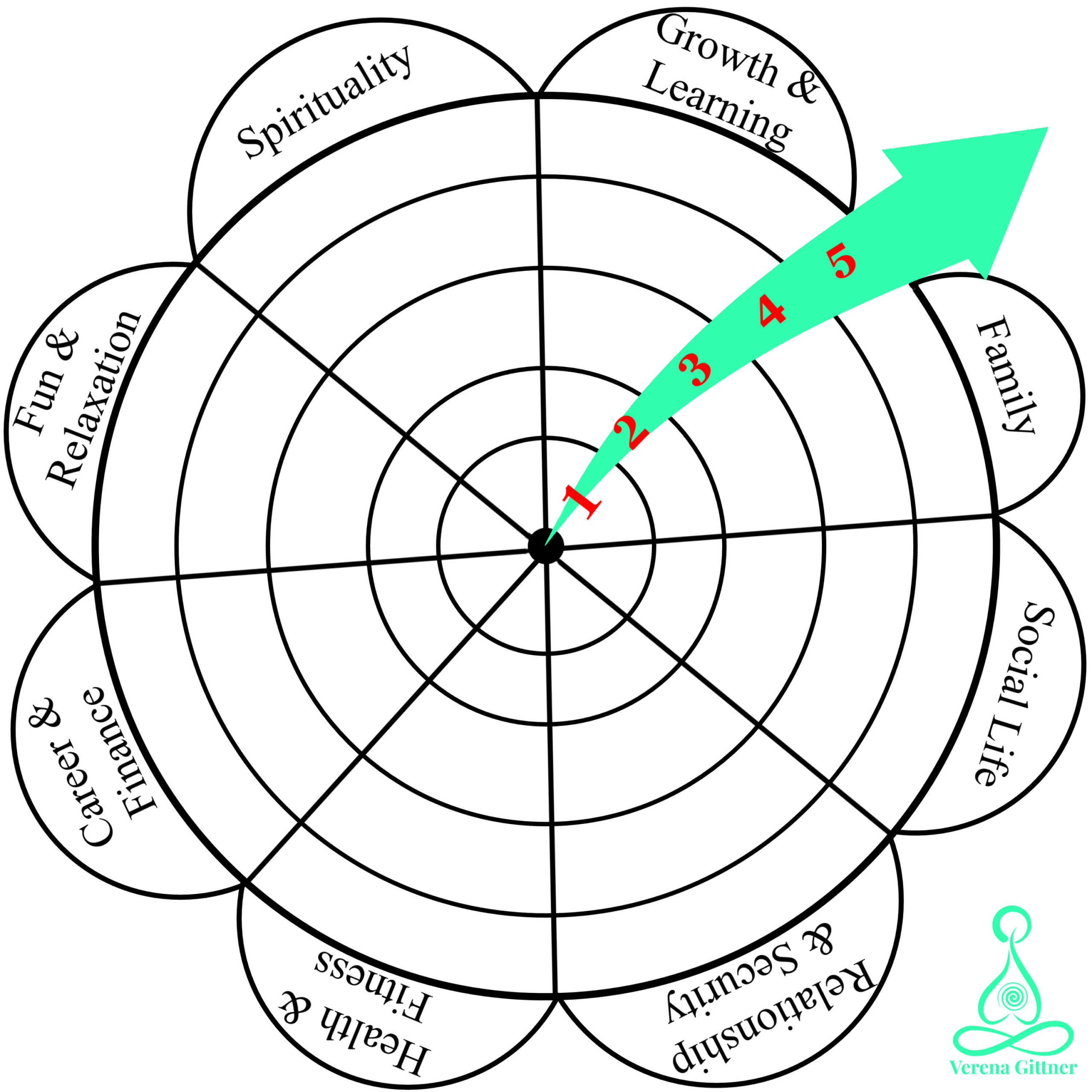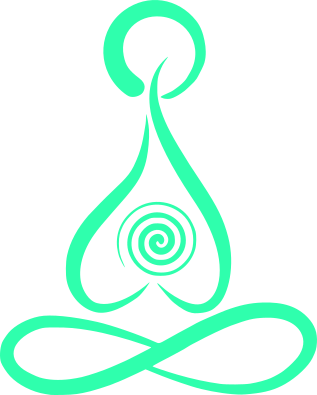Your Wheel of Life


In order to take better care of yourself and accept you as you are, you need to develop a deep understanding. By this I mean that you have to understand yourself on a deep level. Only then you will get the necessary insights to ask the right questions to get the best for yourself in every situation.
The problem is that we often do not know exactly what we want. We are confused, dissatisfied and feel stuck and unfulfilled. We simply cannot say exactly why we feel this way, and we long for guidance and guidance.
With this in mind, how do you reach a point where you have the crystal clear clarity needed to continue to develop yourself optimally? This is where the wheel of life comes into play.
The purpose of the Wheel of Life
It is used to visually evaluate the satisfaction of a person in different areas of life. This visual representation helps to understand where the gap lies between the current reality and the desired reality.
The Wheel of Life essentially highlights two important things:
- The highest priorities in life. In other words, what is most important to you?
Areas that require more attention so that you can achieve a higher level of fulfilment and life satisfaction. - However, the Wheel of Life goes much further. It also lays the foundation for goal-setting, as it encourages you to analyse your current reality while visualizing your desired reality.
Furthermore, the Wheel of Life provides a visual representation of the balance or imbalance between different areas of life. Understanding where these levels are helps you to better deal with life transitions and changes. The key, of course, is to restore this balance.
Alternative applications for the wheel of life
Before we look at the use of the Wheel of Life, it is important to note that this tool can actually be used in several ways.
For example, you can use the wheel of life to:
- Prioritize activities or goals.
- Track progress towards a goal.
- Identify gaps in areas of knowledge and skills.
- Identify the effects of emotions and stress factors.
I will not go into detail about how the Wheel of Life is used in the above scenarios. Instead, we will focus on how the Wheel of Life is typically used for coaching purposes. Understanding this main approach will help you to get a feeling for how the Wheel of Life works. This will allow you to adapt your approach and apply it in the above mentioned scenarios.
Before I continue, I would like to mention a fantastic piece of software that allows you to track your progress towards your goal. The software is called Goalscape and is designed in the form of Lifewheel. You can add goals and other variables and then track your progress from time to time.
Take your wheel of life at hand
Get Wheel of Life!
I will explain to you step by step how you can use the Wheel of Life to gain insight and clarity about your current life circumstances.
As you work through the following three steps, it is helpful to have a current Wheel of Life at hand. Here I have included a PDF link to a Wheel of Life that I am using for the upcoming Holistic Healer Tribe course.
Now that you have your Wheel of Life at hand, let's see how you can use it.
Step 1: Brainstorm your highest life priorities
Start by brainstorming in several areas of highest priority. These are areas that are most important to you in terms of a balanced and satisfying life. These areas could include career, friendship, family, finances, etc.
Also consider your life roles and which specific roles are most important to you. For example husband, mother, manager, teacher, sister, brother, etc. Knowing these roles will give you insights into the life priorities and areas that are most important to you as a client.
For example, if being a loving mother is important to you, then you immediately know that family is one of the areas you should focus on. If it is important to you to be a successful manager, this naturally leads to career-related values. Considering this, "career" would be one of the areas you would list on the wheel of life.
After you have listed your priorities and emphases, you should decide on some key areas that you would like to include in the Wheel of Life.
For the purpose of our discussion, I have selected nine key areas that we will explore in this article. You do not necessarily need to list the same areas in your Life Coaching Wheel of Life. It is actually important that you only list the areas that are most important to each client. Therefore, your list may vary from client to client. However, the areas listed below are often key areas that are high priority for most people. In addition, a high rank in all these areas helps to create an overall balance in a person's life. Here they are:
- Growth & Learning
- Family
- Friendship
- Relationship & Security
- Health & Fitness
- Career & Finances
- Fun & Recreation
- Spirituality
List the areas that are most important to you and ask yourself the following questions about each area of life:
How balanced do you feel in this area of your life?
On a scale of 0 to 5 (where 0 means you are not satisfied at all and 5 means you are completely satisfied), how satisfied are you with this area of your life?
How did you come to this number?
What could be missing in this area of your life?
Are you neglecting something that could be useful for this area of your life?
At this stage it is important to remember that each area of your life that is listed in the Wheel of Life is part of the whole. By this I mean that each area is influenced by every other area. Therefore, changes and improvements in one area usually affect other areas of the Wheel of Life.
The ultimate goal, of course, is to find a balance in each area of life. However, balance may not be the right word to describe the ultimate goal. What you are looking for here is a state of equilibrium where things do not necessarily have to be in the same balance for this balance to exist.
By this I mean that a person should not give the same attention to every area of life. Some areas require more attention than others. Furthermore, some areas require more attention at certain times than at other times. And of course, all this depends on how you set priorities and figure out how to achieve a state of balance by focusing on the right areas for an optimal period of time.
With this in mind, you are playing the role of a director here. By using effective questioning techniques, you can make yourself find that balance for yourself. It is up to you to give yourself this direction. Once you have set the ball rolling, often all the pieces will start to fall into place by themselves.


Photo by mandala_thangka_school
Step 2: Examine each area of life with these questions
Now that you have a relatively good understanding of what your life looks like from a bird's eye view, it is time to ask some deeper and more thorough questions to get a clearer picture of the factors that influence each area of your life.
The questions you ask here should encourage you to look at different aspects of your life in a more helpful and solution-oriented way. In other words, it is about finding out how to improve the ranking you originally assigned to each area of your life.
Let's now spend some time dividing each area by asking the following questions:
Questions about Growth & Learning
- How do you grow as a person?
- Which new ability would make a difference?
- Where are you motivated to improve?
- How would you make these improvements?
Questions about family
- What is the best part of your family life?
- What do you want to change or improve?
- What are you most committed to?
Questions about friendship
- How is your social life?
- What do you want to change or improve?
- What is most important to you with a friend?
- Where in your life are these people?
Questions about relationships & security
- How do you think about the health of your relationship?
- How do you feel in this relationship?
- Where do you want to improve your relationship?
- How could you make these improvements?
Questions about health & fitness
- How do you feel about your health?
- What do you tolerate at the moment?
- Are you getting enough rest and relaxation?
- Where do you have to take better care of yourself?
- How can you better take care of yourself?
Questions about career & finances
- What is most satisfying about your work?
- With which specific things are you less satisfied?
- What expectations do you have of your work?
- What is most important to you in your work?
- How good is your current job offer?
- What needs to change in this area of your life?
- What made you decide to place money on this level?
- How would you like things to change?
Questions about fun & recreation
- How do the things you own improve your life?
- How do the things you own affect your life?
- What is your environment like at home and at work?
- What changes would make the biggest difference?
- What fills your life with joy and passion?
Questions about Spirituality
- What do you strive for in this area of your life?
- What could be missing in this area of your life?
Remember, each area is connected in some way. It can help to improve a certain aspect of your life, very often this can positively influence other seemingly unrelated aspects.
It is important to know that these questions are designed to help you get started. There are many more questions you could ask yourself about any aspect of your life. Usually these questions arise as you work through each area. Please do not limit yourself to these questions.


Step 3: Paving the way forward


It is important to ensure that the goal you pursue first has the greatest positive impact on all other aspects of your life. In other words, you want to achieve a goal that makes the biggest difference across the board with the least amount of effort. And of course, starting small, but thinking big at the same time is the right way.

